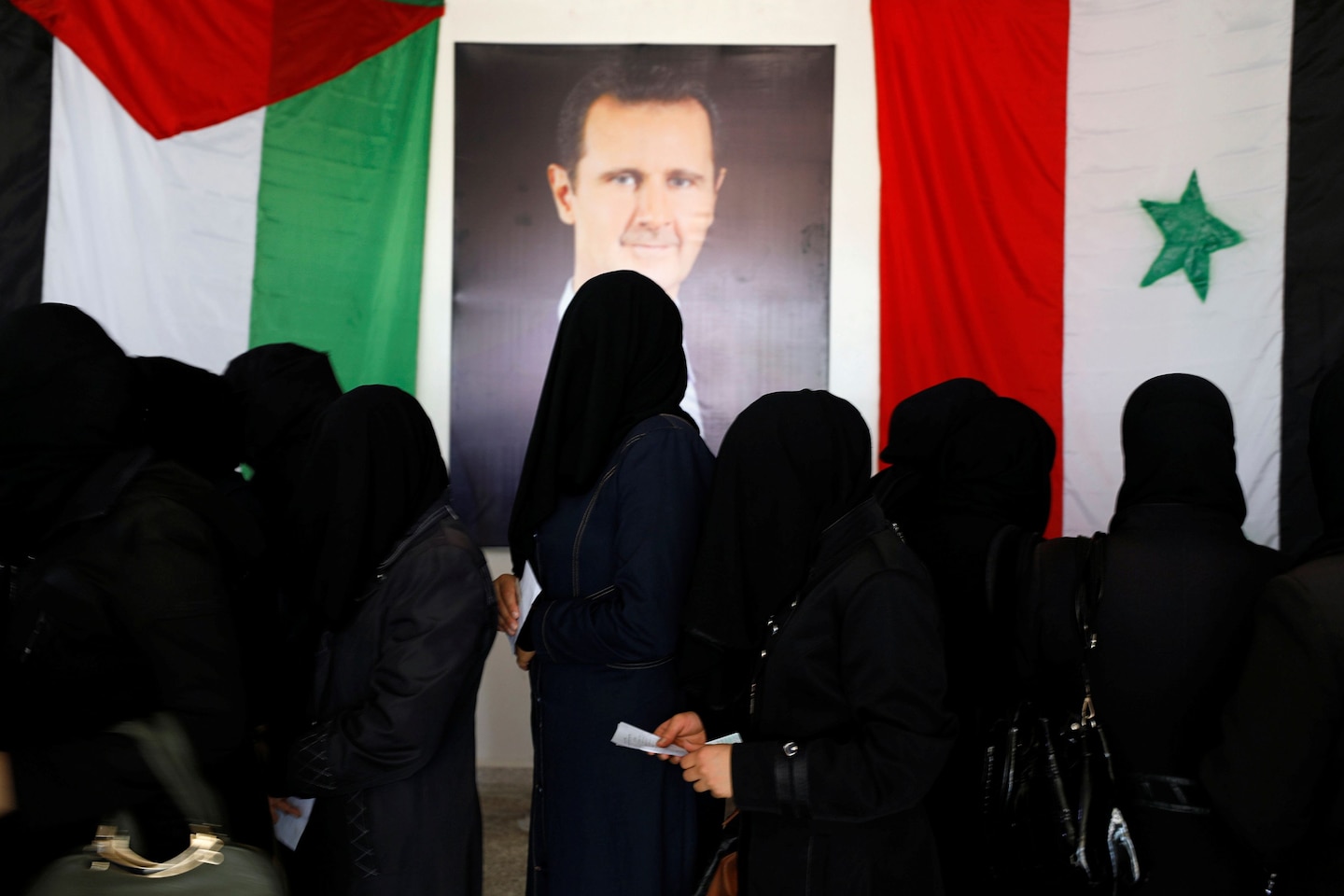Syria’s elections have always been fixed. This time, even candidates are complaining.

Out were some of the traditional urban elites who had sat for years in the 250-seat Syrian People’s Council, as the parliament is known. Taking their place are some of the militia leaders and war profiteers who have risen to prominence over the past nine years of civil conflict, to considerable resentment on the part of ordinary Syrians, who have seen their living standards collapse as the war’s destruction took its toll.
All of the winners and losers are staunch supporters of President Bashar al-Assad. Under Syria’s electoral rules, candidates must be vetted by the security agencies, guaranteeing a loyal and compliant legislature.
The overall result was therefore not a surprise — a large majority of at least 177 seats for a “National Unity” coalition, comprising the main pro-regime political parties, with the lion’s share — 166 seats — going to Assad’s Baath Party, which has dominated Syrian politics for the past 57 years.
But the outcry that has greeted several of the localized results points to some of the fissures that have emerged within the loyalist community as the urgency of the fight against the rebels gives way to a struggle to survive the imploding economy.
Allegations of fraud, ballot-stuffing and political interference have been leveled by losing candidates. Eyebrows have been raised at the large number of votes cast despite accounts from witnesses that turnout was low. Some candidates complained that their names had been inexplicably struck off the ballot paper at the last minute to make way for regime favorites.
Among them was Sendos Mawardi, who found out hours before the vote Sunday that her name had been replaced by that of Hussam al-Qaterji, one of the newly rich business executives, whom the European Union placed under sanctions for smuggling wheat and flour on behalf of the regime.
In a series of Facebook postings, Mawardi refuted reports that she had voluntarily withdrawn and charged that winning candidates had bought their seats.
“Some candidates reached parliament by paying millions,” she wrote in one of the posts, appealing to Assad to establish a committee to investigate her allegations and reminding him of her loyalty.
“You remain an asset to this country and its people, who are suffocating because of how widely corruption and corrupt people have spread,” she said.
One of the most prominent losers was Fares Shehabi, an Aleppo industrialist who had used his stature as a member of the previous parliament both to advocate for reconstruction funds for Aleppo and to heap praise on Assad.
“I have been pushed aside by a malicious and blatant conspiracy, and by dirty and scandalous means,” Shehabi wrote on his Facebook page. “Had I actually lost in a transparent and clean election, it would have been different.”
Syria’s election process has never been transparent. But these polls appeared to have featured unusually overt levels of corruption, said a pro-government journalist living in Syria, who spoke via a messaging app on the condition that he not be identified because of the risks associated with speaking to foreign journalists.
Although the names of the Baath Party candidates have always been fixed in advance, he said, in past elections there were at least some seats open to independents that could be won by those who received the highest number of votes.
“This time it was all fixed,” he said.
The government said the elections had been free and fair. “No violations or infringements have been registered,” the official news agency SANA quoted the head of the elections committee, Samer Zumriq, as saying.
Rarely have such accusations of malfeasance been so loudly voiced, however. Syrians have become increasingly vocal in their criticisms of their government’s notoriously corrupt practices in recent years as frustration grows with the dire economy. The Syrian currency has lost over 60 percent of its value this year, and over 80 percent of the population lives in poverty, according to the United Nations.
The criticisms have laid bare one of the new divides in government-held areas of Syria, between the traditional bourgeois elites who stood by Assad throughout the war and the newly rich warlords and smugglers who actively helped him win it. It is the warlords who are now being rewarded with parliamentary seats, said Joseph Daher of the European University Institute.
“What’s changed is the faces,” said Ruwan al-Rejoleh, a Syrian analyst based in Washington who maintains close ties with Damascus. “They’re the nouveau riche of the war, the ones affiliated with militias who made money from sieges and checkpoints.”
Few Syrians she knows took the elections seriously, she said. Parliamentary seats have been bought and sold in the past, and few would have been surprised by the public airing of such practices.
But for Syrians who had hoped that the winding down of the war would herald a new era, the elections have come as another disappointment, said a university student from the Damascus suburbs, who also spoke on the condition of anonymity.
“It’s not shocking that the elections are corrupt. This has been the story every four years since before I was born,” he said. “But this time feels particularly bad because we ask ourselves: Did nine years of bloodshed and destruction really not change anything at all?”
Khattab reported from Paris.






